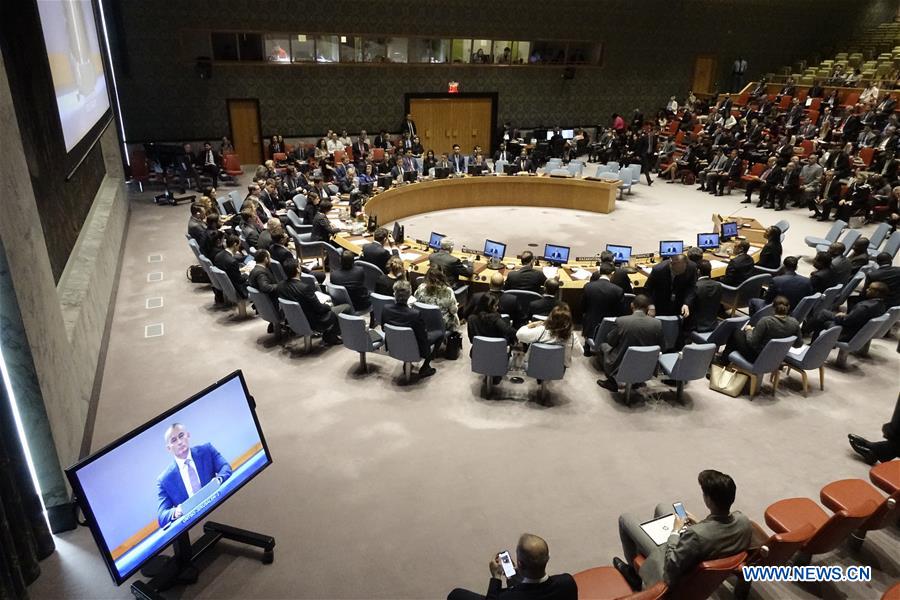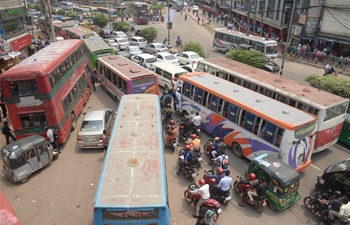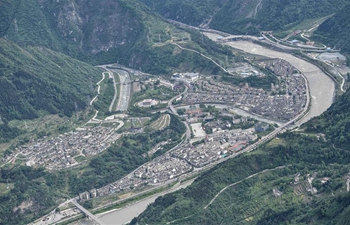
Photo taken on May 15, 2018 shows an emergency meeting held in response to Monday's violence in Gaza, which had led to the deaths of at least 60 Palestinians at the hands of Israeli security forces, at the UN headquarters in New York. The UN Security Council on Tuesday condemned the massive killing of Palestinians at Gaza Strip's border with Israel, with some members insisting on conducting an independent probe into the big death toll. (Xinhua)
by Xinhua writer Wang Jiangang
UNITED NATIONS, May 15 (Xinhua) -- The UN Security Council on Tuesday condemned the massive killing of Palestinians at Gaza Strip's border with Israel, with some members insisting on conducting an independent probe into the big death toll.
CONDEMNATION
At the request of Kuwait, a public briefing of the Security Council was convened under the agenda item "the situation in the Middle East, including the Palestinian question."
The meeting was held in response to Monday's violence in Gaza, which had led to the deaths of at least 60 Palestinians at the hands of Israeli security forces.
Bolivian Ambassador to the United Nations, Sacha Llorenti, pointed out that the situation was not a conflict, but an "occupation," emphasizing that the two sides were painfully unequal in the current colonial equation.
The unilateral decision by the United States to transfer its embassy to Jerusalem had inflamed the situation, he added, recalling that resolution 478 (1980) prohibited such actions.
The United States, which supported the occupying power, was not merely an obstacle to peace, it was now part of the problem, not the solution, he noted.
Nickolay Mladenov, special coordinator for the Middle East Peace Process, described Monday as a day of tragedy for the people of Gaza.
"My heart weighs heavy today as I begin by expressing my condolences to the families of those killed yesterday and the last six weeks of demonstrations," he said, calling upon all to condemn the actions that had led to the loss of so many lives in the strongest possible terms.
Israel had a responsibility to calibrate its use of force and not to use lethal force except as a last resort, when under imminent threat of death or serious injury, he emphasized.
Reaffirming the right to peaceful protest, the Russian representative said that his country condemned the use of force against civilians.
INVESTIGATION
Karen Pierce, British ambassador to the United Nations, said that "the death toll alone warranted such an inquiry, which should be made public and hold perpetrators to account."
An "independent and transparent investigation" was necessary, including on Israel's use of live fire in such situations and attacks on that country's defense forces.
Riyad Mansour, permanent observer of the State of Palestine to the United Nations, pointed out that employing such force against civilians could be defined as terrorism.
Rejecting the idea that Palestinians were responsible for their own deaths because they were protesting Israel's actions, he called for a full investigation and questioned why one state had blocked other Council members from demanding independent inquiries into what amounted to a war crime against the Palestinian people.
The United States blocked a Security Council statement drafted Monday that called for an independent investigation into the situation.
Delegates widely condemned the fighting, with Kuwaiti ambassador Mansour Ayyad Al-Otaibi expressing regret that the Council had failed to adopt his delegation's Monday draft resolution.
Kuwait would take action in the UN General Assembly to ensure the perpetrators of the killings were held to account. He also called for measures that would offer international protection to the Palestinian people.
TWO-STATE SOLUTION
On the status of Jerusalem, Pierce said it should only be determined through a settlement negotiated by both parties, with the city being "a shared capital of Israel and Palestine."
A political process must now deliver a solution, especially since the situation in Gaza was deteriorating rapidly, she said, asking Mladenov to advance proposals for easing the situation in Gaza, including international support for infrastructure and other needed services.
Joanna Wronecka, permanent representative of Poland to the United Nations, reiterated Poland's commitment to a two-state solution, adding that the future capital of both states must materialize through negotiations.
The status of Jerusalem should assume mutual recognition of historical relations, she said, adding that her country would continue to respect the international consensus on Jerusalem as embodied in resolution 478 (1980) until the city's final status was resolved.
Other delegates defended the two-state formula as the only viable way forward, with Ethiopia's representative underlining that all arguments to the contrary were unrealistic. Ways and means must be found to save the two-state formula premised on dependable security for Israel and the realization of Palestinian national aspirations, he said.
RESTRAINT
"The cycle of violence in Gaza needs to end," Mladenov emphasized.
"The Secretary-General and I have repeatedly called on all to exercise restraint, for all necessary steps to avoid an escalation and for all incidents to be fully investigated," he said.
He said an estimated 35,000 Gazans had participated in demonstrations on Monday, while other Palestinians had marched in the West Bank cities of Ramallah, Bethlehem, Hebron, Jericho, Nablus and East Jerusalem, speaking out against the relocation of the United States embassy from Tel Aviv to Jerusalem.
More than 100 people had been killed since the start of the protests on March 30, he said.
Urging the Council to step up efforts in support of a peaceful resolution to the Israeli-Palestinian conflict, he called upon all parties to refrain from taking unilateral measures.
They should instead advance the goal of two states, Israel and Palestine, of which Gaza was an integral part, living side by side in peace, security and prosperity, he stressed.
Swedish UN Ambassador Olof Skoog urged all parties to act with the utmost restraint to avoid further loss of life and to protect civilians, particularly children.
Emphasizing that the immediate priority must be to defuse the current tensions on the ground, he said all parties must take immediate steps to de-escalate the situation.
Sweden regretted that the press statement proposed by Kuwait could not be adopted and hoped that a way forward on an appropriate public expression could be found.















